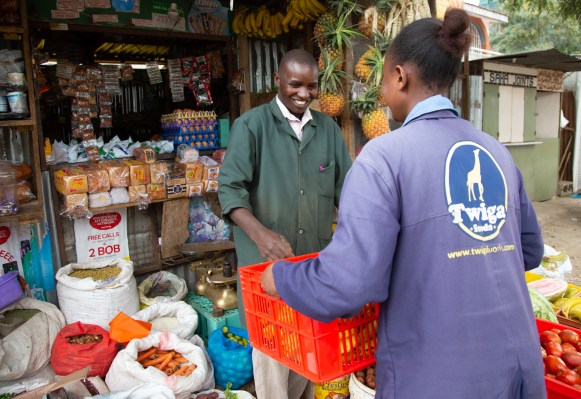Twiga will conduct another round of layoffs to keep its business afloat amid macroeconomic headwinds that have made capital harder to raise, and forced venture-backed companies to scale down their operations. The Kenyan B2B e-commerce platform said it is laying off 283 employees, representing 33% of its 850 workforce as it pushes for a “lean, agile and cost-effective organization.”
Twiga said it is making new “strategic operating adjustments” including doing away with in-house delivery, which was supported by leased trucks, and in its place hiring contractors on a per-use basis.
To this effect, the company has introduced a logistics marketplace that opens up its delivery services to independent truckers. The company said its marketplace’s route-to-market tool will bring down its logistics costs by 40%. This is the second time that the company is getting rid of an in-house department after it dismissed its sales team for independent agents.
The company told TechCrunch it has also shut down 10 distribution centers in Nairobi, and moved all operations to a modern 200,000-square-foot warehouse it opened officially last year. Twiga’s products include the Soko Yetu platform, which enables vendors to buy from a list of suppliers, and Twiga Fresh, its flagship fresh-produce venture that seeks to solve traceability challenges, stock outs and price volatility.
“Twiga Foods Limited operations are still up and running. However, based on recent corporate fine-tuning processes, Twiga has taken several interventions to optimize its operations and enhance operating efficiencies. These interventions include the introduction of a logistics marketplace…adopting a central warehouse model at Tatu City and transitioning our sales approach to a commission-based agents’ model has also resulted in improved operating efficiency,” said Twiga co-founder and CEO, Peter Njonjo.
Twiga, co-founded by Njonjo and Grant Brooke in 2014, also confirmed that its Western Kenya operations are ongoing, although some buyers were unable to place orders. It maintained that it is “working on improving its Western Kenya operations in a bid to optimize service in the region.”
“This optimization process will involve the design of an improved route-to-market model in Western Kenya regions such as Kisumu, Kisii, and Eldoret, which a single central depot may ultimately serve once the process is complete. Our Kampala, Uganda Depot continues to operate, as does our Taita-Taveta farm operations,” said Njonjo.
Twiga cited its customers’ declining purchasing power as the other reason for the changes. The company joins the growing list of startups in Africa and across the globe (including B2B e-commerce platforms like Copia and MarketForce) that are downsizing amid a slowdown in VC funding, which has made capital expensive and hard to access.
“It is particularly instructive to note that, in the last 24 months, the macroeconomic environment has changed dramatically, locally and internationally, escalating the cost of capital significantly. The cost of capital has increased substantially for venture-backed startups, and there is a need to restructure the business model and make it more resilient to the prevailing environment. Those who do not change will not be here tomorrow,” said Njonjo.
Twiga counts Paris- and Nairobi-based family office and private equity firm Creadev, TLcom Capital, IFC Ventures, DOB Equity and Goldman Sachs’ spinoff Juven amongst its backers.
